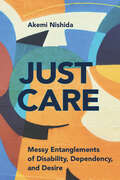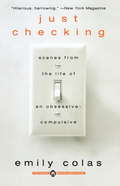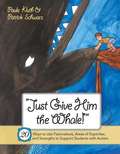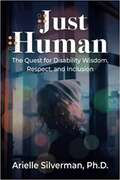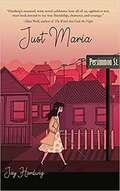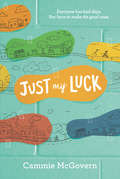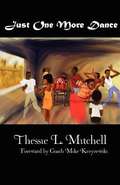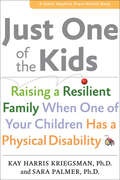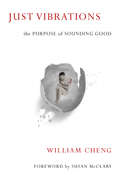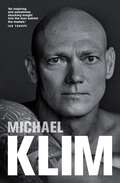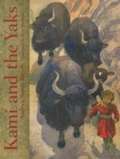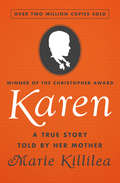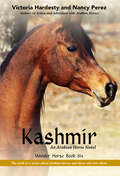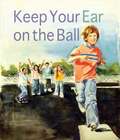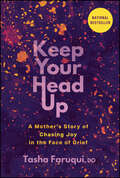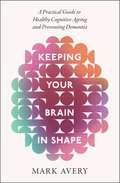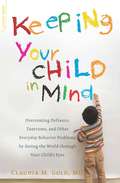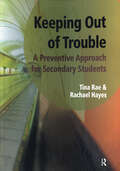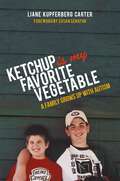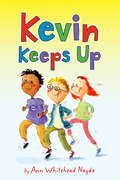- Table View
- List View
Just Care: Messy Entanglements of Disability, Dependency, and Desire (D/C: Dis/color)
by Akemi NishidaJust Care is Akemi Nishida’s thoughtful examination of care injustice and social justice enabled through care. The current neoliberal political economy has turned care into a business opportunity for the healthcare industrial complex and a mechanism of social oppression and control. Nishida analyzes the challenges people negotiate whether they are situated as caregivers, receivers, or both. Also illuminated is how people with disabilities come together to assemble community care collectives and bed activism (resistance and visions emerging from the space of bed) to reimagine care as a key element for social change. The structure of care, Nishida writes, is deeply embedded in and embodies the cruel social order—based on disability, race, gender, migration status, and wealth—that determines who survives or deteriorates. Simultaneously, many marginalized communities treat care as the foundation of activism. Using interviews, focus groups, and participant observation with care workers and people with disabilities, Just Care looks into lives unfolding in the assemblage of Medicaid long-term care programs, community-based care collectives, and bed activism. Just Care identifies what care does, and asks: How can we activate care justice or just care where people feel cared affirmatively and care being used for the wellbeing of community and for just world making?
Just Checking: Scenes from the Life of an Obsessive-compulsive
by Emily ColasJust Checking: scenes from the life of an obsessive-compulsive was written by Emily Colas in the year 1998. Separated into four parts, Emily Colas provides snapshots of her daily life and the struggles that she faces as a result of her disorder: obsessive-compulsive disorder. The anecdotes of her life are written in a journal-like manner. The entries cover all aspects of her life from her cheating college boyfriend, to her family life and raising her two children, and to her interaction with friends. Throughout all of the excerpts Emily Cola’s frantic worries are evident, especially her constant fear of contracting diseases from the most common daily interactions with other humans. Colas’ most evident worry is that she will instantaneously contract a disease from the most minuscule sample of blood. When strangers, including the babysitter of her children, enter her home she becomes obsessed with every possible chance that they may infect her home. Therefore, Colas’ developed a system of checkpoints so she could determine whether or not the bathroom was used, a drawer opened, or anything touched. As the book proceeds the narrator begins to deal with her illness and she struggles to get better. Her marriage fell apart as a result of her disorder and she and her husband divorced. Eventually, after Colas’ married life disintegrated, she decided to take action and get help for her disorder. The narrative covers the stress that her condition placed on her family. A family member's negative response to the person's disorder can increase the OCD behavior. Colas started taking medication and made the conscious effort to stop obsessing over unimportant matters. The last section of entries demonstrates a healthier and more controlled person and the reader sees a change in the narrator.
Just Give Him the Whale!: 20 Ways to Use Fascinations, Areas of Expertise, and Strengths to Support Students with Autism
by Paula Kluth Patrick SchwarzWhen learners with autism have deep, consuming fascinations--trains, triangles, basketballs, whales--teachers often wonder what to do. This concise, highly practical guidebook gives educators across grade levels a powerful new way to think about students' "obsessions": as positive teaching tools that calm, motivate, and improve learning. Written by top autism experts and nationally renowned speakers Paula Kluth and Patrick Schwarz, this guide is brimming with easy tips and strategies for folding students' special interests, strengths, and areas of expertise into classroom lessons and routines. Teachers will discover how making the most of fascinations can help their students learn standards-based academic content boost literacy learning and mathematics skills develop social connections expand communication skills minimize anxiety and much more"Just Give Him the Whale" is packed from start to finish with unforgettable stories based on the authors' experience, firsthand perspectives from people with autism themselves, research-based recommendations that are easy to use right away, and sample forms teachers can adapt for use in their own classrooms. An enjoyable read with an eye-opening message, this short book will have a long-lasting impact on teachers' understanding of autism--and on their students' social and academic success.
Just Human: The Quest For Disability Wisdom, Respect, And Inclusion
by Arielle SilvermanBorn without sight, Dr. Arielle Silverman has never missed the visual. Being blind never bothered her much but, as she grew, she discovered others saw her blindness very differently. Many people saw her as either helpless or inspirational, but rarely did they see her as just human, with the same capacities and desires as her peers. Arielle has spent a lifetime exploring ways to foster respect and inclusion, not only for blind people like her, but for all of us whose bodies or minds differ from the norm. <P><P> In Just Human, she reflects on her formative years and presents unique anecdotes from her life that carry teachable moments for all of us. She recalls the feel of her mother’s embrace, the smell of her grandparents’ brisket, the inner sensations of a preteen crush, the music on her wedding day, and scholarly lessons from her dissertation research. Her words paint pictures from her mind’s eye: a vision of a world where we can radically accept ourselves and our fellow humans, while at the same time work to change systems of inequality. As she writes of the past and the present, Arielle looks toward the future, considering how we can build a more inclusive world for those who come after us.
Just Maria
by Jay HardwigJust Maria is the story of Maria Romero, a blind sixth-grader who is trying her hardest to be normal. Not amazing. Not inspiring. Not helpless. Not weird. Just normal. Normal is hard enough with her white cane, glass eyes, and bumpy books, but Maria’s task is complicated by her neighbor and classmate JJ Munson, an asthmatic overweight oddball known in the halls of Marble City Middle as a double-dork paste-eater. When JJ draws Maria into his latest hare-brained scheme—a series of public challenges to prove their worth as gumshoes for his Twinnoggin Detective Agency—she fears she’s lost her last chance to go unnoticed. When a young girl goes missing on the streets of Marble City, Maria’s new-found confidence is tested in ways she never anticipated. Use your cane and your brain, and figure it out . . . Aimed at middle-grade readers, Just Maria explores difference and disability without resorting to the saccharine and engages universal themes about the price of popularity and the meaning of independence.
Just My Luck
by Cammie Mcgovern<P>Critically acclaimed author Cammie McGovern's middle grade debut is a powerful and heartwarming story that will appeal to readers who loved R. J. Palacio's Wonder, Ann M. Martin's Rain Reign, and Holly Sloan's Counting by 7s. <P>Fourth grade is not going at all how Benny Barrows hoped. He hasn't found a new best friend. He's still not a great bike rider--even though his brother George, who's autistic, can do tricks. And worst of all, he worries his dad's recent accident might be all his fault. Benny tries to take his mom's advice and focus on helping others, and to take things one step at a time. But when his dad ends up in the hospital again, Benny doesn't know how he and his family will overcome all the bad luck that life seems to have thrown their way. <P>Just My Luck is a deeply moving and rewarding novel about a down-on-his-luck boy whose caring heart ultimately helps him find the strength to cope with tragedy and realize how much he truly has to offer his friends and family.
Just One More Dance
by Thessie L.MitchellJust One More Dance is the author's story of how a tragic accident changed his life. When Thessie Mitchell jay walked across the street little did he know how that day would change his life forever. A car hit him and left him a quadriplegic. Thessie tells his life story from a hospital bed. He describes his years on the police force and the ups and downs of his professional and personal life.
Just One of the Kids: Raising a Resilient Family When One of Your Children Has a Physical Disability (A Johns Hopkins Press Health Book)
by Sara Palmer Kay Harris KriegsmanSupporting and encouraging all members of the family when a child has a physical disability.If you have a child with a physical disability, how can you plan your family’s life in a way that is inclusive for everyone? What can you do to create a family where every member pulls his or her own weight (in appropriate measure), meets challenges, and has moments in the spotlight along the way? Most parents of a child who has a physical disability want their child to have fun, be responsible, make friends, and take acceptable risks—in short, to feel like "just one of the kids"—and they want to make sure that the needs of the whole family are met, too.Just One of the Kids is designed to help parents focus not on what could have been but instead on what can be, so that they, their children, and the grandparents thrive as individuals and as a family. The advice from psychologists Kay Harris Kriegsman and Sara Palmer is valuable for any family with children who have a physical disability, from any cause. Their warm and encouraging book is full of family stories, tips, and tools. Parents of children with physical disabilities can help them develop the skills needed to meet life’s challenges and launch into independence. Parents, building on that foundation and acknowledging each person’s contributions, interests, and aspirations, create an inclusive and resilient family.
Just Vibrations: The Purpose of Sounding Good
by Susan Mcclary William ChengModern academic criticism bursts with what Eve Kosofsky Sedgwick once termed paranoid readings--interpretative feats that aim to prove a point, persuade an audience, and subtly denigrate anyone who disagrees. Driven by strategies of negation and suspicion, such rhetoric tends to drown out softer-spoken reparative efforts, which forego forceful argument in favor of ruminations on pleasure, love, sentiment, reform, care, and accessibility. Just Vibrations: The Purpose of Sounding Good calls for a time-out in our serious games of critical exchange. Charting the divergent paths of paranoid and reparative affects through illness narratives, academic work, queer life, noise pollution, sonic torture, and other touchy subjects, William Cheng exposes a host of stubborn norms in our daily orientations toward scholarship, self, and sound. How we choose to think about the perpetration and tolerance of critical and acoustic offenses may ultimately lead us down avenues of ethical ruin--or, if we choose, repair. With recourse to experimental rhetoric, interdisciplinary discretion, and the playful wisdoms of childhood, Cheng contends that reparative attitudes toward music and musicology can serve as barometers of better worlds.
KLIM
by Michael KlimAs one of Australia's most celebrated athletes, Michael Klim's impact extends far beyond the pool.Klim's journey to greatness began behind the Iron Curtain, in communist-era Poland. His family made a bid for freedom in the 1980s and immigrated to Australia, where swimming became his passport into a new culture and eventually led him to become one of his adopted country's great sporting heroes.His crowning moment came at the 2000 Sydney Olympics, where he captured the hearts of millions with his gold medal performances and world record-breaking swims.But being a champion athlete does not come without personal challenges. Beyond his achievements in the pool, Klim's life has been equally compelling. Through transitions in the business world, family life and major health trials, his natural buoyancy kept him afloat - until he faced a crisis that forced him to reassess his life and fight for his future.From the heights of Olympic glory to the depths of personal adversity, KLIM is a testament to the power of passion, perseverance and the unsinkable human spirit.'An inspiring and sometimes shocking insight into the man behind the medals.' IAN THORPE'Michael Klim's finest moment isn't Olympic glory - it's the courage he summoned to share himself so honestly in this sports memoir for the ages.' RICH ROLL
Kami and the Yaks
by Andrea Stenn StryerJust before the start of a new trek, a Sherpa family discovers that their yaks are missing. Young Kami, anxious to help his brother and father maintain their livelihood, sets off by himself to find the wandering herd. A spunky deaf child who is unable to speak, Kami attempts to summon the yaks with his shrill whistle. Failing to rout them, he hustles up the steep mountainside to search the yaks' favorite grazing spots. On the way he encounters the rumblings of a fierce storm which quickly becomes more threatening. Surmounting his fear of being alone in the midst of treacherous lightning and hail, Kami uses his heightened sense of observation to finally locate the yaks. Reunited with their animals, the astonished family is once again able to transport their gear and guide the mountain climbers into the majestic terrain.<P><P> Winner of the Schneider Family Book Award
Kansas Weddings: Three Brides Can Never Say Never to Love Again (Romancing America)
by Kim Vogel SawyerLife Isn't Always Easy Following drastic life changes, three Kansas women find it in new stages of life. Will love follow them there? After losing her parents in a fatal accident, Marin Brooks steps into their shoes to care for her brother, John, who has Down syndrome. Marin refuses to place him in an institution, the urgings of family and friends. Philip Wilder helps disabled individuals gain independence, but Marin isn’t interested. God helps these two caregivers reconcile their differences. Carrie Mays, who is about to receive a large inheritance, wants people to look at her and not see dollar signs—she wa be loved for being herself. Rocky Wilder has always dreamed of having money, but now that he has become a Christian, all he wants is to follow the path the Lord has laid cut for him. These two find common ground? Following her drug-related arrest, Angela Fischer is out and in God’s family, but she still feels alone. Her newest Christian friend, Ben Atchison, can’t seem to forgive her past and thinks she’ll always be an addict. Will Ben allow his heart to trust Angela—and the God who promises to make her a new person? Follow the journeys of three Kansas women as they experience changes that turn their worlds upside down and invite love.
Karen
by Marie KillileaAs told by her mother, the inspirational story of Karen, who--despite a handicap--learns to talk, to walk, to read, to write. Winner of the Golden Book Award and two Christopher Awards. THERE WAS SOMETHING SPECIAL ABOUT MY CHILD... I knew it from the moment she was born... A minute morsel, she weighed under two pounds, and measured nine inches from the tip of her tiny head to her infinitesimal toes.... I lay back still, bathed in happiness. It was like a brittle shell, this happiness, and I felt that motion or sound might shatter it.... I could still feel the surge of unbelievable wonder and joy evoked by the baby's lusty yell. "What do you think of our child? Is she as pretty as Marie? Did you count her fingers and toes?"... He sat down at the foot of the bed and I waited for him to express his delight. "You must realize"--John spoke gently-- "she's not out of the woods yet." A gust of cold air entered my sun-drenched room and I shivered.... The sequel is available in this library.
Karen: A True Story Told by Her Mother
by Marie KillileaWinner of the Christopher Award: This bestseller tells the inspirational true story of a girl with cerebral palsy and the mother who wouldn&’t give up on her. In 1940, when Karen Killilea was born three months premature and developed cerebral palsy, doctors encouraged her parents to put her in an institution and forget about her. At the time, her condition was considered untreatable, and institutionalization was the only recourse. But in a revolutionary act of faith and love, the Killileas never gave up hope that Karen could lead a successful life. Written by Karen&’s mother, Marie, this memoir is a profound and heartwarming personal account of a young mother&’s efforts to refute the medical establishment&’s dispiriting advice, and her daughter&’s extraordinary triumph over seemingly insurmountable odds. Marie&’s activism spread awareness of the mistreatment of disabled people in America and led to the formation of multiple foundations, including United Cerebral Palsy. A larger-than-life story, Karen tells of a family&’s courage, patience, and struggle in the face of extreme difficulty. The New York Times wrote, &“You&’ll want to read it most for Karen&’s own words: &‘I can walk, I can talk. I can read. I can write. I can do anything.&’&”
Kashmir: An Arabian Horse Novel
by Victoria Hardesty and Nancy PerezKashmir was an abandoned and angry Arabian gelding who had no use for humans. Katie Barclay grew up in the world of Rodeo. She was a driven young lady who planned her life to include specific milestones. When she failed to reach one of them, the failure crushed her and sent her into a deep depression. Kashmir began to remember unique things about himself that his mother taught him as a baby when he recognized some of those same unique qualities in fifteen-year-old Katie. As their connection grew, it healed Kashmir as much as it healed Katie. They became a team. They forged a partnership going against long-held beliefs that Arabian horses had no place in Rodeo. Katie and Kashmir demonstrated the truth in their performances. At the same time, each of them found new ways to use their unusual abilities to help others.
Keep Your Ear on the Ball
by Genevieve PetrilloFrom the book Jacket: Everybody wants to help Davey. "Let me open that." "Do you want to hold my hand?" Davey has one answer for all, "Thanks, but no thanks." Davey is blind-and he is perfectly capable of doing everything on his own. His well-meaning classmates stop offering help when they see how able Davey is. They respect his selfreliance-until he tries to play kickball. After several missed kicks and a trampled first baseman, no one wants Davey on his or her team. But by working together, the children figure out a way to offer help that respects Davey's unique abilities and his desire for freedom. In this seamless tale, based on a true story, the children realize that interdependence can be just as important and rewarding as independence.
Keep Your Head Up, Mr. Putnam
by Peter PutnamThis story, told from Mr. Pudnam himself, tells of the early years of the Seeing eye and how he trained with his first guide dog. Blinded in a gun accident before his eighteenth birthday, this story is of Pudnam grew to accept his blindness, and go and train with his first dog.
Keep Your Head Up: A Mother's Story of Chasing Joy in the Face of Grief
by Tasha FaruquiA testament to the depth of familial love and our ability to endure in the face of childhood terminal illness Keep Your Head Up is the incredible tale of one family's path to perseverance in the face of devastating odds. When author Tasha Faruqui gave birth to her second daughter, Soraya, she knew immediately that something was wrong. Yet as years passed and every medical test for Soraya came back normal or inconclusive, Tasha began to realize that science doesn't always have the answers, and there are some issues in life that simply cannot be fixed. Yet, we can continue to find happy moments and celebrate the beauty of what we have. This story gives a voice to parents and loved ones of terminally ill children, illuminating the way to comfort, community, and unbreakable hope. This book discusses terminal illness with raw honesty, demonstrating how families can provide transparency to life-limited children around a terminal diagnosis, comfort them when they are afraid of what comes next, and continue to embrace life despite ongoing challenges. With beautiful narration and a heartfelt perspective, Keep Your Head Up testifies to the true depth of familial love and the hard things we can endure with grace and resilience. This book: Provides guidance, hope, and understanding to parents and caregivers of terminally ill children Tells a story that will resonate with families facing elusive diagnoses, fickle healthcare systems, and emotional turmoil Offers hope that it is possible to find joy in the face of tragedy and give sick children the gift of a fully lived life Presents the balanced and relatable perspective of an award-winning pediatrician and parent to a child in hospice Parents, family, and friends of terminally ill children, as well as healthcare professionals and educators, will appreciate Keep Your Head Up for its candor and its value as a guide to moving through a situation no family should have to face.
Keeping Your Brain in Shape: A Practical Guide to Healthy Cognitive Ageing and Preventing Dementia
by Mark AveryAre you worried about signs of dementia in yourself or a loved one? How can you tell what is abnormal cognitive decline and what is a typical feature of getting older? What steps can you take to keep your brain in shape for longer?The good news is that there is a lot of detailed and rigorous scientific research to answer these questions. The bad news is that there is so much of this that it is a daunting and bewildering process to make sense of it. You would soon become lost in a complex world of scholarly articles where the findings can appear contradictory and hard to fathom. How can you deduce what practical steps you might need to actually take?Mark Avery's comprehensive and easily-readable guide is here to help you navigate a pathway through the maze of literature on cognitive ageing. You will find here chapters on hearing loss, sleep, social networks, physical activity, grief, drinking and breathing. The book also deals with the importance of living in the present − coping with technological change and remaining curious about the world around you.This book provides you with an action plan for what positive steps you can take to keep your brain healthy and in good working order for as long as possible and includes:· An introduction to understanding how to interpret the science· A glossary of terms associated with cognitive ageing· A unique approach to easily navigating the book in whichever way you choose· Helpful summaries with clear action points
Keeping Your Child in Mind: Overcoming Defiance, Tantrums, and Other Everyday Behavior Problems by Seeing the World through Your (A Merloyd Lawrence Book)
by Claudia GoldBeing understood by someone you love is one of the most powerful feelings, at all ages. For a young child, it is the most important of all experiences because it allows the child’s mind and sense of self to grow. In the midst of the perennial concerns parents bring to Dr. Claudia Gold, she shows the magical effect of seeing a problem from their child’s point of view. Most parenting books teach parents what to do to solve behavior problems, but Dr. Gold shows parents how to be with a child. Crises are defused when children feel truly heard and validated; this is how they learn to understand, and, eventually, control themselves. Dr. Gold’s insightful guide uses new research in developmental psychology and vivid stories from her practice to show parents how to keep a child in mind and deepen this central relationship in their lives.
Keeping out of Trouble: A Preventive Approach for Secondary Students
by Tina Rae Rachael HayesThe Keeping Out of Trouble programme will enable secondary schools to provide interventions targeted at students who are, or are at risk of, committing criminal offences. By developing the students' awareness of victims, the consequences of their actions and sensitive issues as well as by encouraging students to engage in self-reflection, students will develop the strategies, knowledge and understanding to support themselves in making informed choices about their behaviour and future actions. This essential new resource is based on a programme that was developed by staff in the Youth Offending Team and The Hillingdon Pupil Referral Unit, who recognised that students needed more support. The programme fits in with the Every Child Matters agenda, tackling the 'Be Healthy' 'Stay Safe' 'Enjoy & Achieve' and 'Making a Positive Contribution' aims. The Keeping Out of Trouble programme consists of an initial tutorial session, followed by 16 group sessions and a final self-evaluation and target setting session. These strands of support aim to meet the following objectives: *To enable students to develop consequential thinking *To encourage the development of victim awareness *To develop an understanding of restorative work and ways that they can engage in this kind of work *To enable students to develop an awareness of their own feelings and the ability to label, identify and express these feelings in a safe way *To further develop personal insight, gaining knowledge of strengths and weaknesses and the ability to take structured criticism and feedback *To encourage the development of confidence and self-assurance *To encourage the development of self-reflection skills *To develop an awareness of the consequences of their behaviours - both for themselves and others *To further develop a sense of responsibility and locus of control, that is, to have internal control *To encourage students to further develop and appreciate the perspectives of others, that is, empathy *To encourage students to develop a range of strategies to pre-empt and avoid anti-social and offending behaviours *To encourage facilitators and students to cooperate as joint problem-solvers, engaging in wide ranging discussions around key issues The programme is aimed at: *All young people, especially those who have demonstrated anti-social or criminal behaviour *A group of young people of a similar age *Young people who have not been identified as prolific offenders
Kenneth Jernigan: The Master, The Mission, The Movement
by Kenneth JerniganCompiled writings of Dr. Kenneth Jernigan with editorial introduction and notes
Ketchup is My Favorite Vegetable: A Family Grows Up with Autism
by Susan Senator Liane Kupferberg CarterHow do you create an ordinary family life, while dealing with the extraordinary needs of an autistic child? Meet Mickey - charming, funny, compassionate, and autistic. In this unflinching portrait of family life, Liane Kupferberg Carter gives us a mother's insight into what really goes on in the two decades after diagnosis. From the double-blow of a subsequent epilepsy diagnosis, to bullying and Bar Mitzvahs, Mickey's struggles and triumphs along the road to adulthood are honestly detailed to show how one family learned to grow and thrive with autism.
Kevin Keeps Up
by Chris Russo Ann Whitehead NagdaOh no! Beezer the Buzzard will be the sub while Mrs. Steele is away, and Kevin is going to be dead meat! When Mrs. Steele goes on an extended trip to Africa, Kevin knows he'll be stuck inside for every recess and have his desk moved to the front of the class. Mrs. Beezer just doesn't understand Kevin's problems with focusing and controlling his impulses. This charming chapter book takes a perceptive look at ADHD and the challenges it can present in school.
Key Concepts in Learning Disabilities (SAGE Key Concepts series)
by Tom Mason Geoff Astbury Pat Talbot"A helpful resource for those undertaking studies in learning disabilities at all levels. I shall definitely be recommending it to my students!" - John Boarder, Bangor University "This book provides a valuable and innovative contribution to the field of Learning Disabilities." - Logan Parumal, University of Manchester Key Concepts in Learning Disabilities is a handy guide to the topics you need to know about whether studying or working in the field of Learning Disabilities. The A-Z format allows you to "dip in" and quickly find relevant information on topics ranging from Autism to Rights and from Advocacy to Challenging Behaviours. Each entry features: - a snapshot definition of the concept; - a broader discussion of the main issues and applications to practice; - key points; - a case study, and - signposts to further reading. Key Concepts in Learning Disabilities is an ideal companion to study and particularly useful for those completing academic assignments as part of training. Written by a team of experienced practitioners and lecturers, the book reflects the multi-disciplinary nature of contemporary practice.
